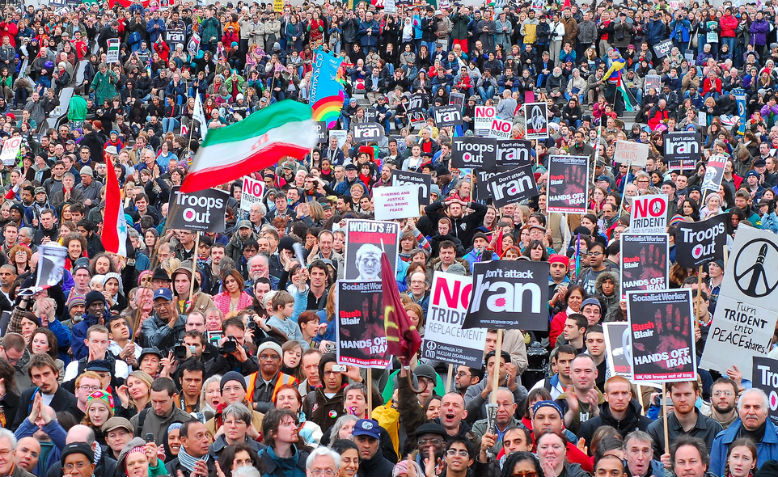 Stop the War demonstration in London, 2007. Photo: David Hunt
Stop the War demonstration in London, 2007. Photo: David Hunt
Labour HQ’s campaign against anti-war party members shows why the movement needs to be strengthened, writes Chris Nineham
The leaked report into Labour’s handling of antisemitism has caused shock and anger throughout the Labour movement and beyond. It has revealed that many Labour officials at the Party’s HQ were working systematically to undermine Corbyn’s leadership and were bitterly disappointed at the Party’s impressive showing in the 2017 general election. Considering how explosive the report is, it has had very little media coverage.
But the mainstream media has so far completely ignored another of the reports revelations; that there was a concerted campaign in Labour’s HQ against members or applicants for Labour party membership who held anti-war views. Labour’s membership surge from 2015 to 2017 was partly generated by people with anti-war views rallying to Labour under new leader Jeremy Corbyn who was until 2015 chair of the Stop the War Coalition and was promising to make radical changes to Labour’s foreign policy positions.
The Daily Maverick has pointed out that shortly after the publication of the Chilcot report into Tony Blair’s handling of the Iraq War in July 2016, the leaked report shows Labour party staff added the term “war criminal”, a term often used to describe Tony Blair, to an unofficial list of “banned phrases” that applicants and members were not allowed to use. The plan was that anyone found using this term, or others like it would be expelled from the party or refused entry.
The next month this approach was broadened. A compliance officer stated that “calling someone a warmonger” was “generally … enough in itself” to act against members. The report shows that disciplinary powers were widely used to expel Corbyn supporters and stop more joining using these and other similar criteria.
The campaign was part of a failed attempt to try to stop Corbyn winning the second leadership election later in 2016, an election that was triggered by a vote of no confidence in Corbyn in the Parliamentary Labour Party, partly because of his anti-war views.
But hostility to Corbyn and to anti-war politics remained strong in Party HQ despite Corbyn’s second leadership election victory. The general election campaign of 2017 was punctuated by the terrible bombing of a concert in Manchester on 22 May by a British Libyan man. Jeremy Corbyn responded at an international press conference the following day by explaining that the growth in terrorism was more than anything else the product of the disastrous foreign wars that successive British governments had pursued since 2001. Opinion polls the following day showed that around three quarters of the British population agreed with him, and just over two weeks later, Labour achieved its biggest surge in votes since 1945.
But many in Labour HQ were contemptuous. The leaked report shows widespread anger at the speech and even at the fact that it was popular. One Labour staffer commented in a WhatsApp group that “In the face of a terror attack normal people do not blame foreign intervention they blame immigration.” Another responded by saying “The speech won’t go down as badly as it deserves to thanks to the large groundswell of ill-informed opposition to all western interventions.”
Other responses show the scale and passion of the opposition to anti-war policies at Labour’s HQ. Just before the election campaign shadow defence secretary had criticised Corbyn and shadow foreign secretary Emily Thornberry for their support for nuclear disarmament. Labour’s Head of Press praised Griffiths as a “bloody hero” in a WhatsApp group, saying” “She doesn’t bullshit and she’s just just stabbed corbyn and thornberry [sic].” He went on to say that Thornberry was “awful” and “should pay in the reckonning [sic]” if Corbyn lost the general election.
The majority of Labour members remain opposed to war. The anti-war movement needs to be strengthened inside and outside of Labour to push back against the right who will clearly stop at nothing to block anti-war policy.
Join Revolution! May Day weekender in London
The world is changing fast. From tariffs and trade wars to the continuing genocide in Gaza to Starmer’s austerity 2.0.
Revolution! on Saturday 3 – Sunday 4 May brings together leading activists and authors to discuss the key questions of the moment and chart a strategy for the left.

